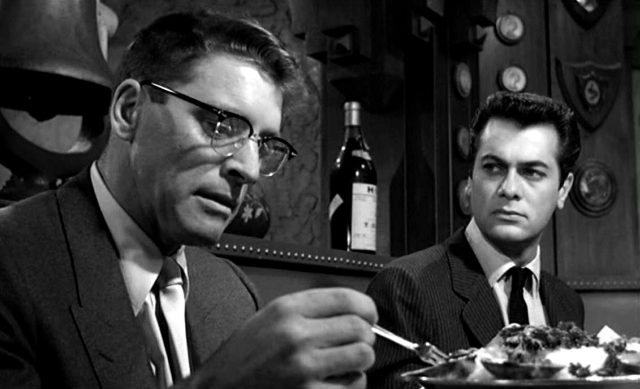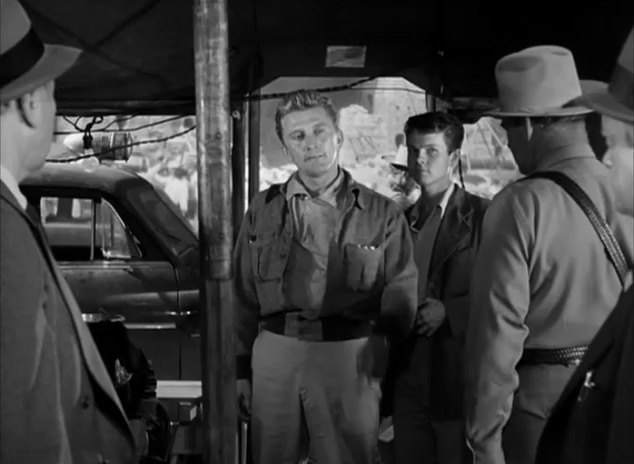Side Street (1949)

Farley Granger stars as Joe Norson, a part-time postman struggling to make ends meet. He delivers to an attorney's office and sees a couple of packets of cash fall off the lawyer's desk. He helpfully goes to pick it up and a big lug of a guy sitting on the edge of the desk puts his feet on the cash, and tells Joe to "Leave it." Joe nods and backs out. We soon find out that the attorney, Victor Backett (Edmon Ryan) and his henchman, Georgie Garsell (James Craig) are involved in a blackmail scheme along with Lucille 'Lucky' Colner (Adele Jergens)--we'll soon see that her 'Lucky' moniker is sadly ironic. They're putting the heat on rich man Emil Lorrison (Paul Harvey), who was messing around with Lucky and some pictures were taken to blackmail him into giving up $30,000. In fact, near the very first of the film, we see him withdrawing that amount from the bank, much to the surprise of a questioning teller (Whit Bissell). Lorrison takes the money and despite trying to haggle over the price, gives the money over in exchange for the pics and takes off.
Meanwhile, Joe is at home (apartment) with his expectant wife, Ellen (the beautiful Cathy O'Donnell, once again playing a patient and understanding woman), and her parents. Joe is chafing at this situation, as his job is not permanent and his wife is due that week. So, tempted by the money he saw in the law office, he delivers the daily mail under the door and checking the door, sees it unlocked and a note saying that the lawyer will be back later. He takes the opportunity to snoop around and the only place the money can be is in a file cabinet, but it's locked. Frustrated, he walks out but stops at the stairs when he sees a fire axe left lying around carelessly. He takes it and busts into the cabinet and upon seeing part of the money during a peek, takes the whole satchel it's stowed in. He goes to a rooftop and finding privacy, looks in, and discovers the $30,000. He takes it out and leaves the stachel stowed away on the roof. Joe keeps about $250 on him and then heads to a local bar that he frequents on his mail rounds. He has the money wrapped up like a present and asks the barman if he'll keep it squirreled away for him for a few days until he can surprise his wife with that "gift." Can you guess this is a big mistake? When he feels guilty about it, he goes to the attorney's office and tells Backett that he took the money. Backett acts like he doesn't know what he's talking about, telling him he must have the wrong office. In fact, there's not even a filing cabinet! A frustrated Joe goes out, just as Garsell walks in. When Backett tells Garsell what Joe knows about, Garsell wants to go after him, but Backett stops him, telling him he could wind up in the electric chair. It seems that they've killed 'Lucky."
Joe knows nothing about this. He goes back to get the money but the bartender has suddenly "retired." Hmm. He tracks him which doesn't end good. He becomes a suspect in a murder. He has to tell his wife after she's had the baby. The police are after him. It ain't looking good for Joe, as every avenue keeps him running.
This is a fine little piece of noir, with Granger doing a good job as a desperate guy having to fight for himself with noboby to help him. He goes into a nightclub to talk to a slightly soused singer, Harriet Sinton (Jean Hagen), who may have info he needs. Hagen does a fine job as she drinks and slurs her voice more and more. O'Donnell is super sweet as always playing the ever-understanding wife, even after her husband mentions the word "murder." Craig is effectively gruff and violent as Garsell, the ex-con who wants that money and will go after, despite his boss telling him to cool it. Paul Kelly is fine as usual as Captain Walter Anderson, who is looking hard for Norson. Charles McGraw (
The Narrow Margin) is excellent in his supporting role as Detective Stanley Simon, who, while helping the Captain track down leads, is one the phone a bit and we get to hear that terrific gravely voice of his. Whit Bissell is very good in the three scenes he has. The last one is with Granger, who puts some fear into Bissell. The only drawback to this movie for me is that Paul Kelly narrates a bit too much in the first third of the film, and at the very end. I suppose its apropos because of the fast finish at the end, Kelly wraps it up for us. I was going to knock it back half a popcorn bucket because of the narration while I was watching it but by the end I was feeling pretty generous because of the entertainment level, watching Granger trying to squirm out of one mess after another, so in the end, it gets:
 He had one helluva career!
He had one helluva career! He had one helluva career!
He had one helluva career!








